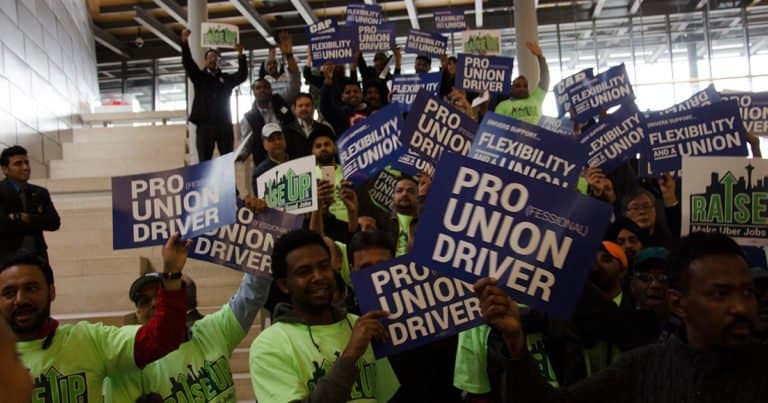
Sharon Block is a Professor of Practice and the Executive Director of the Center for Labor and a Just Economy at Harvard Law School.

Yoorie Chang is the Project Manager for the Clean Slate for Worker Power Project at Harvard Law School’s Center for Labor and a Just Economy.

Benjamin Sachs is the Kestnbaum Professor of Labor and Industry at Harvard Law School and a leading expert in the field of labor law and labor relations. He is also faculty director of the Center for Labor and a Just Economy. Professor Sachs teaches courses in labor law, employment law, and law and social change, and his writing focuses on union organizing and unions in American politics. Prior to joining the Harvard faculty in 2008, Professor Sachs was the Joseph Goldstein Fellow at Yale Law School. From 2002-2006, he served as Assistant General Counsel of the Service Employees International Union (SEIU) in Washington, D.C. Professor Sachs graduated from Yale Law School in 1998, and served as a judicial law clerk to the Honorable Stephen Reinhardt of the United States Court of Appeals for the Ninth Circuit. His writing has appeared in the Harvard Law Review, the Yale Law Journal, the Columbia Law Review, the New York Times and elsewhere. Professor Sachs received the Yale Law School teaching award in 2007 and in 2013 received the Sacks-Freund Award for Teaching Excellence at Harvard Law School. He can be reached at [email protected].
View the full report here.
Political gridlock has stymied federal labor law reform efforts, and decades of Supreme Court preemption doctrine inhibits cities and states from enacting policies that impact the organizing and collective bargaining process. Yet in spite of these challenges, workers, advocates, and policymakers have continued to organize, push for, and win policies at the state and local level that enable workers to build power in meaningful ways.
Several states have passed or proposed constitutional amendments affirming the right to collective bargaining and barring future attempts to enact right-to-work legislation. Over a dozen cities and states have established sector-wide workers’ boards that give workers a seat at the table in determining standards for wages and workplace conditions. Project labor agreements, community benefit agreements, and prevailing wage laws attached to bids for public contracts have helped to support high-quality jobs and strong labor standards. And just last month, Illinois became the eighth state to pass legislation prohibiting captive audience meetings. These are a few examples of the dozens of state and local policies our team has surveyed over the past year. Today, CLJE:Lab is thrilled to share the culmination of our exploration with the launch of Building Worker Power in Cities and States: A Toolkit for State and Local Labor Policy Innovation.
This toolkit is intended to serve as an accessible resource for policymakers, advocates, and others interested in exploring the possibilities for protecting workers’ rights at the state and local levels. In compiling and analyzing pro-worker policies that states and cities have enacted – or attempted to enact – we sought to map the contours of labor law preemption and identify promising areas for further innovation.
Our toolkit contains the following 11 sections, each of which includes background information, objectives of state or local intervention, analyses of preemption risk, and options for state or local action:
- State Constitutions and Public Sector Collective Bargaining Rights
- Workers Excluded from the NLRA
- Workers’ Boards
- Structural Reforms and Strategic Enforcement
- Benefits Administration
- Government Procurement and Spending Authority
- Industrial Policy
- Regulating AI in the Workplace
- ESG and Responsible Investment Practices
- Protecting Unions from Tort Liability and Civil RICO Suits
- Regulation of the Employment Relationship and Miscellaneous Power-Building Policy
This resource was compiled with several key challenges in mind. Under-resourced state and local legislative offices often lack the capacity needed to pursue novel legislation and navigate complex policy landscapes. State preemption of local efforts to pass worker-friendly policies adds another layer of complication for municipalities. In light of these challenges, we sought to ensure that the content of our toolkit is widely accessible and relevant to a broad audience of stakeholders. In the months ahead, we will conduct deep dives into featured policy areas through a new workshop series. We look forward to engaging a wide range of participants – workers, advocates, and policymakers – to strategize together about building a stronger infrastructure for pro-worker policymaking.
The time is now to pursue creative new strategies that give workers a say in their workplaces, protect the right to organize and collectively bargain, and build capacity for robust labor standards enforcement at the state and local levels. In light of the slate of recent Supreme Court decisions further constraining the federal government’s ability to ensure worker protections, the role of cities and states in defending workers’ rights has become ever more critical. We hope this resource may meaningfully inform future iterations of policy solutions to meet the evolving challenges working people face.
You can find Building Worker Power in Cities and States in both interactive digital and downloadable PDF formats on our website, where you’ll also find additional toolkit content including worker testimonies, policy trackers, model legislation, and links to further resources. As we continue to track and analyze policy developments across the country, we encourage you to check back frequently for updates to the toolkit. We look forward to hearing your feedback and suggestions.










Daily News & Commentary
Start your day with our roundup of the latest labor developments. See all
December 22
Worker-friendly legislation enacted in New York; UW Professor wins free speech case; Trucking company ordered to pay $23 million to Teamsters.
December 21
Argentine unions march against labor law reform; WNBA players vote to authorize a strike; and the NLRB prepares to clear its backlog.
December 19
Labor law professors file an amici curiae and the NLRB regains quorum.
December 18
New Jersey adopts disparate impact rules; Teamsters oppose railroad merger; court pauses more shutdown layoffs.
December 17
The TSA suspends a labor union representing 47,000 officers for a second time; the Trump administration seeks to recruit over 1,000 artificial intelligence experts to the federal workforce; and the New York Times reports on the tumultuous changes that U.S. labor relations has seen over the past year.
December 16
Second Circuit affirms dismissal of former collegiate athletes’ antitrust suit; UPS will invest $120 million in truck-unloading robots; Sharon Block argues there are reasons for optimism about labor’s future.